
One of the things I love most about Chicago's frozen winters is the freezing of Lake Michigan. It's an odd thing to love, given what it represents about the weather, but it's grandly peaceful when the quiet of the city is reflected by the surface of the lake being stilled by the cold.
This winter didn't bring that pleasure, but obviously it's been unusually warm, thanks to Arctic weather and the activity of the sun; this year's ice cover was the lowest in recorded history (which stretches only back to 1973). Lake Erie, in particular, saw a huge drop in ice coverage.
But if long-term trends continue, expect fewer ice floes. NOAA scientist Jia Wang recently co-authored a study examining the ice cover from our first records until last winter, and found a definite trend across all of the Great Lakes—ice cover is declining across the board, with a 71 percent drop across all of them. Here's the trend line for Lake Michigan (PDF):

There's a lot of year to year variability, but the trend represents a loss of two percent per year, 77 percent over the entire time frame. That's comparable to the other greater Great Lakes; Lake St. Clair and Lake Erie have lost less ice cover over time (37 and 50 percent), likely because being smaller and shallower, conditions have to be less extreme for them to ice over.
The authors cite two reasons:
We are learning that two factors are contributing to changes in Great Lakes ice cover: 1) natural variability of air temperature in response to ENSO and NAO/AO patterns as described above; and 2) increases in air temperature due to anthropogenic effects.
Like most weather phenomenona, it's a combination of short-term influences and long-term change, and the authors attribute manmade climate change as the cause for the latter.
Photograph: Arzaga (CC by 2.0)


